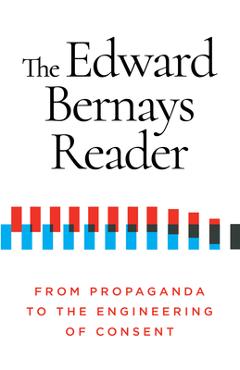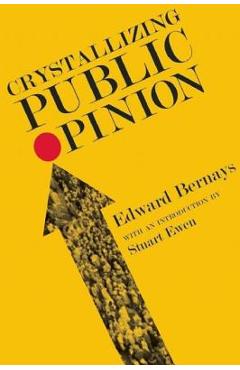The Edward Bernays Reader: From Propaganda to the Engineering of Consent - Edward Bernays

Detalii The Edward Bernays Reader: From
libris.ro
111.32 Lei
123.69 Lei
Political Science
Edward Bernays
The Edward Bernays Reader: From - Disponibil la libris.ro
Pe YEO găsești The Edward Bernays Reader: From de la Edward Bernays, în categoria Political Science.
Indiferent de nevoile tale, The Edward Bernays Reader: From Propaganda to the Engineering of Consent - Edward Bernays din categoria Political Science îți poate aduce un echilibru perfect între calitate și preț, cu avantaje practice și moderne.
Preț: 111.32 Lei
Caracteristicile produsului The Edward Bernays Reader: From
- Brand: Edward Bernays
- Categoria: Political Science
- Magazin: libris.ro
- Ultima actualizare: 28-10-2025 01:22:05
Comandă The Edward Bernays Reader: From Online, Simplu și Rapid
Prin intermediul platformei YEO, poți comanda The Edward Bernays Reader: From de la libris.ro rapid și în siguranță. Bucură-te de o experiență de cumpărături online optimizată și descoperă cele mai bune oferte actualizate constant.
Descriere magazin:
Bernays, Edward: - A seminal and controversial figure in the history of political thought and public relations, Edward Bernays (1891-1995), pioneered the scientific technique of shaping and manipulating public opinion, which he famously dubbed engineering of consent. During World War I, he was an integral part of the U.S. Committee on Public Information (CPI), a powerful propaganda apparatus that was mobilized to package, advertise and sell the war to the American people as one that would Make the World Safe for Democracy. The CPI would become the blueprint in which marketing strategies for future wars would be based upon. Bernays applied the techniques he had learned in the CPI and, incorporating some of the ideas of Walter Lipmann, became an outspoken proponent of propaganda as a tool for democratic and corporate manipulation of the population. His best-known campaigns include a 1929 effort to promote female smoking by branding cigarettes as feminist Torches of Freedom and his work for the United Fruit Company connected with the CIA-orchestrated overthrow of the democratically elected Guatemalan government in 1954. He worked for dozens of major American corporations including Procter & Gamble and General Electric, and for government agencies, politicians, and non-profit organizations. Of his many books, Crystallizing Public Opinion (1923) and Propaganda (1928) gained special attention as early efforts to define and theorize the field of public relations. Citing works of writers such as Gustave Le Bon, Wilfred Trotter, Walter Lippmann, and Sigmund Freud (his own double uncle), he described the masses as irrational and subject to herd instinct--and outlined how skilled practitioners could use crowd psychology and psychoanalysis to control them in desirable ways.

Produse asemănătoare
Produse marca Edward Bernays

The Edward Bernays Reader: From Propaganda to the Engineering of Consent - Edward Bernays
![]() libris.ro
libris.ro
Actualizat in 28/10/2025
111.32 Lei

A Summary of Propaganda by Edward Bernays - Edward Bernays
![]() libris.ro
libris.ro
Actualizat in 28/10/2025
35.65 Lei

Propaganda: La mente pública en construcción (Spanish Edition) - Edward Bernays
![]() libris.ro
libris.ro
Actualizat in 28/10/2025
111.55 Lei
